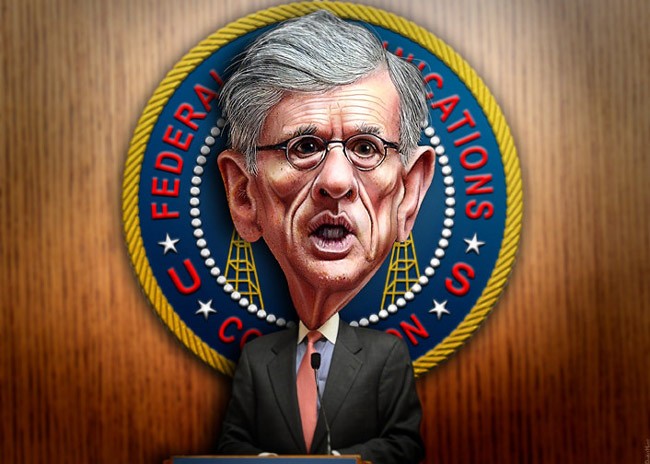
The Federal Communications Commission voted on a proposal Thursday that effectively barred Internet companies from prioritizing some Internet traffic over others. As John Oliver famously explained “ending net neutrality would allow big companies to buy their way into the fast lane, leaving everyone else in the slow lane.”
The FCC’s proposal faces plenty of opposition from telecom companies and others, but it’s just the latest round in a long fight. Here is a brief history of attempts to enact net neutrality and the often successful push against it.
The FCC votes to deregulate cable Internet services.
Tim Wu coins the phrase “net neutrality.”
Fall 2003: Tim Wu, then an associate professor at the University of Virginia Law School, first coins the term “net neutrality” in a paper for the Journal of Telecommunications and High Technology Law. He defines net neutrality to mean an Internet “that does not favor one application…over others.”
The FCC adopts a toothless net neutrality-like policy statement.
 August 2005: The FCC adopts a policy statement to “preserve and promote the open and interconnected nature of public Internet,” which focuses on protecting consumer access to content online and competition among Internet service companies. The statement has no power of enforcement.
August 2005: The FCC adopts a policy statement to “preserve and promote the open and interconnected nature of public Internet,” which focuses on protecting consumer access to content online and competition among Internet service companies. The statement has no power of enforcement.
The first net neutrality bill is introduced in Congress. It dies.
May 2006: Sen. Ed Markey, D-Mass., introduces a net neutrality bill that would keep Internet service companies from blocking, degrading or interfering with users’ access to their services. But the bill stalled in the House Committee on Energy and Commerce and never came to a vote.
The FCC tells Comcast to stop slowing down access to BitTorrent.
August 2008: The FCC, under Republican Chairman Kevin Martin, orders Comcast to stop slowing down user access to BitTorrent, a peer-to-peer sharing network often used to share music and videos.
Comcast sues the FCC, and wins.
September 2008 — April 2010: Comcast voluntary agrees to stop slowing down BitTorrent traffic. But it takes the FCC to court anyway, arguing that the agency is operating outside its authority. Specifically, the company points out that the FCC’s 2005 policy statement on neutrality doesn’t have the force of law.
The FCC writes real rules on net neutrality.
December 2010: Democratic FCC Chairman Julius Genachowski writes an order to impose net neutrality rules. Unlike the FCC’s 2005 policy statement, this new order is a real rule, not just a policy statement.
Except Verizon sues the FCC, saying it has no authority to enforce the rules, and wins.
September 2011 — January 2014: The District of Columbia Circuit Court of Appeals rulesthe Federal Communications Commission can’t enforce net neutrality rules because broadband Internet services don’t fall under its regulatory authority.
Senator introduces net neutrality bill that would ban the FCC from enforcement.
January 2015: Sen. John Thune, R-S.D., introduces a net neutrality bill as a discussion draft that would ban Internet service companies from blocking or degrading services or access to certain content, but would also strip the FCC of authority to enforce any of these rules.
The FCC chairman proposes to reclassify broadband Internet services and enforce net neutrality.
February 2015: Democratic Chairman Tom Wheeler introduces the current net neutrality proposal. Internet service companies such as AT&T and Comcast would be banned from offering paid prioritization to content providers such as Amazon for faster access. But the proposal would also allow Internet service companies to prevent other companies from using their wires to connect homes to the Internet.
The FCC is expected to vote on rules today.
Feb. 26, 2015: The FCC approves the net-neutrality rules in a 3–2 decision, with the two Republican commissioners dissenting.
This almost certainly will result in another fight.
The details of the new rules won’t be made public until after the vote. Experts expectchallenges to the rules as soon as they are published. Michael Powell, a former FCC Chairman and current president and CEO of the National Cable & Telecommunications Association, told CNBC it could take “at least two and up to five years before the rules are fully and finally settled.”
–Leticia Miranda, ProPublica
![]()
Related coverage: Read about state laws that make it difficult for cities to provide cheap, fast Internet through municipal broadband networks.





























Lancer says
The government greed for control is astounding.
Thomas Jefferson said,”It is the nature of things that Liberty should yield to government”. Instead of being ever watchful, we allowed the baby boomers to circumvent the constitution and start down the slippery slope of intrusion.
Shame on us.
First, what’s in a name? I love how they always come up with some innocuous name: “Net NUETRALITY”. Ahhhh! What could go wrong with that? “Patriot Act” and “Affordable Care Act”. Hilarious that this gets overlooked by the government lovers.
Now we have a federal power grab for the internet. They wish to control content, under the guise of “neutrality” and there is no over sight in place to prevent domestic spying and government over indulgence. I often wonder what world people live in that wish to place more power and control in the hands of: Pelosi, Reid, McConnell, etc. What have they done to earn that responsibility?
If a person is paying $1000/ Mo. for internet service…NEWS FLASH…they are always going to get better service than someone paying $15/ Mo. Just like Healthcare…no matter how much you think some legislation is going to punish some rich person…they will ALWAYS be able to afford and get better healthcare. That’s just the way it is. Unfortunately, emotions control the minds of the left and not logic.